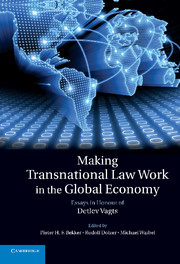Book contents
- Frontmatter
- Contents
- List of contributors
- Foreword: the transnationalism of Detlev Vagts
- List of cases cited
- List of abbreviations and acronyms
- Introduction: a Festschrift to celebrate Detlev Vagts' contributions to transnational law
- 1 Detlev Vagts and the Harvard Law School
- 2 Constructing and developing transnational law: the contribution of Detlev Vagts
- I International law in general
- II Transnational economic law
- III Transnational lawyering and dispute resolution
- Bibliography of Detlev Vagts
- Index
1 - Detlev Vagts and the Harvard Law School
Published online by Cambridge University Press: 17 November 2010
- Frontmatter
- Contents
- List of contributors
- Foreword: the transnationalism of Detlev Vagts
- List of cases cited
- List of abbreviations and acronyms
- Introduction: a Festschrift to celebrate Detlev Vagts' contributions to transnational law
- 1 Detlev Vagts and the Harvard Law School
- 2 Constructing and developing transnational law: the contribution of Detlev Vagts
- I International law in general
- II Transnational economic law
- III Transnational lawyering and dispute resolution
- Bibliography of Detlev Vagts
- Index
Summary
When we think of people who form the foundation of august educational institutions, such as Harvard Law School, our attention, understandably, turns first to official leadership and others very much in the public eye. That ought not to obscure the immense and varied contribution that Detlev Vagts, notwithstanding his characteristic and heartfelt modesty, has made to the life of his law school over the past half-century.
From his initial appointment to the Harvard Law School faculty in 1959 through his two-decade-long tenure (1984–2005) as holder of the Bemis Professorship (Harvard's earliest in international law and a position in which he took great pride), Detlev has been someone who instinctively and imaginatively cut across existing boundaries – disciplinary, national and other – long before that became as fashionable as it now is. That willingness to defy convention, albeit in a mannered fashion, took many forms, but perhaps the most noteworthy involved the development and launching of several courses that greatly enriched the Harvard curriculum and helped cement the School's reputation for innovation in international legal studies during the second half of the twentieth century. Two, in particular, stand out.
Together with his friend and colleague Henry Steiner, Detlev in the late 1960s seized upon the challenge posed by Philip Jessup in his celebrated 1956 Storrs Lectures to devise a pioneering course that they entitled ‘Transnational Legal Problems’, which both discerned patterns of legal interaction across jurisdictional lines that did not fit neatly into the existing fields of public and private international law, and that engaged learning from beyond the law itself to illuminate these patterns.
- Type
- Chapter
- Information
- Making Transnational Law Work in the Global EconomyEssays in Honour of Detlev Vagts, pp. 7 - 9Publisher: Cambridge University PressPrint publication year: 2010

